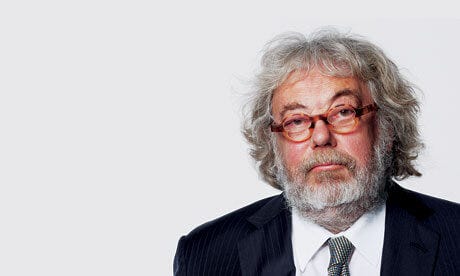Earlier this week, I was walking Koda and thinking about my old boss, Tim Cook. Tim, of course, has no idea I exist. In the 350,000-employee ecosystem that is Apple, he’s the apex predator. For the three years I worked there, I was plankton.
Nevertheless, from far away and far below, I found him absolutely fascinating. Tim Cook, in my opinion, is the most perfectly adapted corporate animal the world has ever produced. He’s the flawless, streamlined and incredibly effective end result of environmental forces that shaped him into what he is, and richly rewarded him for it.
Think of, say, a peregrine falcon, that has evolved to live in high, windy places that would kill other birds. To me, he’s that. Tim has spent essentially his entire career as an executive inside large technology companies. He has risen to the very top of the top of the top. Every particle of his being is about excelling in that environment.
He's worth a billion dollars. He’s private to the point of being ridiculous. He has no spouse, no children, no friends that the world knows about. There are no distractions. He gets up at 4. He’s not a very compelling speaker – slight southern drawl, kind of awkward on stage. He works out a lot, and is clearly fit. He has an oddly delicate, feminine face. And that’s it. Nobody knows anything, really, about him. Or ever will. As far as I can tell, literally the only thing in his life is Apple.
It's interesting, and a little scary, to think about how our society reached the point where people like this are who we reward so greatly. Not writers (ahem) or poets or childcare workers. Instead, we usually reward people who are skilled at leading gigantic, very profitable organizations that make a lot of money. The personality traits that make one a corporate leader, rich, and powerful, sometimes seem to me to also be those of a sociopath.
Here's one example: Normal human behavior includes a certain amount of candor, emotion, uncertainty and error. Most functional adults understand this, and live with it. I, for example, called Freya this morning and apologized for calling her an “asshole” and slamming a door in her face last night. I’m very human. I have several ex-girlfriends, three daughters and an ex-wife who can tell you that.
Tim doesn’t do stuff like that, ever. If there’s a human being in there, he’s so tightly controlled that he’s reminiscent of Data, the android from Star Trek. This makes Tim fantastically good at his job. But I wonder about the person in there. Is there one? Or has the Venn diagram of “CEO of Apple” merged with the “human being” one?

Tim Cook never, ever says anything that isn’t thought through, strategic, effective. He does not make mistakes. Ever, as far as I can tell. It reminds me of Tom Wolfe’s description of the astronaut Neil Armstrong in The Right Stuff:
A lot of people couldn't figure out Armstrong. He had a close blond crew cut and small pale blue eyes and scarcely a line or a feature in his face that you could remember. His expression hardly ever changed. You'd ask him a question, and he would just stare at you with those pale-blue eyes of his, and you'd start to ask the question again, figuring he hadn't understood, and - click - out of his mouth would come forth a sequence of long, quiet, perfectly formed, precisely thought-out sentences, full of anisotropic functions and multiple-encounter trajectories, or whatever else was called for. It was as if his hesitations were just data punch-in intervals for his computer.
Much of what comes out of Tim’s mouth, at least in public, is like this. Much of it, I think, is also complete bullshit, but it’s tactically flawless, and relentlessly delivered.
As an example, I heard an interview with him where someone asked him what inspired him. The answers were ridiculous. His colleagues. Sports. National parks. All stuff dreamed up by the Apple PR team, designed to nudge his image in just the right direction. As one of the most powerful people on the planet, as well as one of the wealthiest, his image is vital. He said exactly what he needed to with just the right, low-key, dose of boyish humility.
I have to admit, by the way, that I’m envious of Tim Cook. I absolutely do not have his level of discipline, and I would like to be worth a billion dollars.
But seriously, think about it. Tim was hand-picked by Steve Jobs, one of the greatest entrepreneurs of all time. He took Apple from being a reasonable large business to being a brontosaurus, mainly through his expertise in things like procurement, logistics, and efficiency. He has not invented any major new products. He’s not much for design, really. But man, can he make the damn trains run on time, and the result is the greatest enterprise the world has ever known. Steve thought it up, but Tim made it unstoppable.
The man is not inspired by the lovely vistas of our nation’s national parks. He’s insanely driven, consumed by a kind of relentless, obsessive focus that propelled him through all the obstacles, mazes, traps, snares and politics of the technology industry. He may be completely crazy. He’s intensely focused and controlled because that serves his mission. But make no mistake – Tim Cook has to be absolutely possessed to be, well, Tim Cook. I would not like to piss him off. When I worked there, I also used to occasionally wonder if he ever had people executed. You know, “Have that asshole killed.”
I also used to think – and this kind of thing is why I didn’t really fit in at Apple – about what would happen if you mated Tim with, say, Taylor Swift. The result would be some kind of superhuman child, nominally human but really some kind of god. Taylor’s looks and talent, merged with Tim’s organizational brilliance and strategic thinking. They share the same level of ambition and drive. It would be quite a kid.
Speaking of kids, now I’m going to turn to Felix Dennis, who was sort of an overgrown child. Felix is the anti-Tim. And he’s one of my business heroes.
Felix, who sadly has passed away, was a British magazine publisher who made several hundred million dollars, too, but unlike Tim, he was playing with his own money. Like Tim, he had no wife, no children, no heirs. But unlike Tim, his life was ferocious, public, messy, passionate, and to me, at least as admirable. Tim looks sleek and controlled and efficient. Felix looked like an unmade bed. His nickname – and I am not making this up – was The Bearded Dwarf. Google it.
Since writing is all about the Telling Anecdote, here’s one about Felix that I particularly cherish. He openly, publicly and repeatedly told the world that he had spent several years of his life neck deep in recreational drugs and very expensive whores. Tim Cook would sooner amputate his arm with a chainsaw than acknowledge something like that if it was true, which it would never be because he would never do something like that.
But Felix had absolutely no problem with the fact that for a long, long time, his daily routine was to wake up, take a bunch of drugs, and then call in Stephanie and Jenn and Octavia and have at it. He had the money. He liked sex. He liked drugs. That’s what he did.
Unlike Tim, he also openly shared a lot of unvarnished truths. This wasn’t stuff that polished his image, and in so doing, enhanced the value of his businesses. Felix told the truth because it was true. I honor him for that. It’s hard for me to honor Tim. It would be like honoring a very effective barracuda. There’s nothing wrong with the guy. He’s just all business, all the time.
For example, like Tim, Felix became very, very wealthy. And unlike almost every wealthy person, he wrote about it, from the inside. And he was absolutely dead honest, regardless of how it made people feel. He wrote that no, money did not make you happy, and he knows, because he’s rich and unhappy. He wrote that in order to get rich, you have to be … well, I’ll quote him:
“Happiness? Do not make me laugh. The rich are not happy. I have yet to meet a single really rich happy man or woman—and I have met many rich people. The demands from others to share their wealth become so tiresome, and so insistent, they nearly always decide they must insulate themselves. Insulation breeds paranoia and arrogance. And loneliness. And rage that you have only so many years left to enjoy rolling in the sand you have piled up.”
And he also wrote that to become rich, you have to be willing to hurt people. As he put it, “Somewhere in the invisible heart of all self-made wealthy men and women is a sliver of razored ice.”
And finally, he made the uncomfortable observation that very few people actually have the drive it takes to become wealthy. Lots of people think they do. But when it comes right down to it, they don’t. It takes a special, impressive kind of candor to openly state that most people are not wealthy because they don’t have what it requires. Wow.
Felix’s relentless honestly and candor extended to himself. He wrote an autobiographical poem about his business like (we’ll get to his poetry in a minute) called, of course, The Bearded Dwarf. Tim Cook spouts corporate platitudes about making the world a better place. Felix describes, in verse, wanting adventure, gold and women.
I’ve sailed the ship.
I’ve owned the line.
I’ve swilled on bilge and drunk fine wine.
I’ve paced the bloody jetty, too.
Not knowing how I’d pay the crew.
Because, at the peak of his business career, with a net worth of around a billion dollars, which he had made by himself, from nothing, Mr. Dennis decided that his next pursuit would be …
Poetry.
As I mentioned earlier, as far as I can tell, there is no Tim Cook outside of Apple. His other interests are either PR decorations or distractions. A lot of very successful businesspeople are like that – they think about the business all the time. Tim, too. I have never seen evidence of him as a human being whose personality or activities don’t somehow help Apple make more money. Business isn’t a game to him. It is him. If you own Apple stock, which I don’t, this is fantastic.
Not Felix. Building a business empire apparently was a game, and after succeeding at that, he turned his hand to a different game -- the spectacularly unlucrative career of writing poems. And he succeeded at that. While he was writing, he was England’s most widely-read poet. He sold more books of poetry than anyone.
And then, as a finale to an absolutely amazing carnival ride of a life, he contracted cancer, I think of the throat, as a result of almost fifty years of smoking. He fought it, he lost, and he died in 2013. And what did he do with all his money? No heirs, after all?
He planted a forest. That may be what makes me love him most of all. With all of his millions and millions, the memorial he wanted was both modest and breathtakingly transcendent. A forest.
I have worked in and around a fair number of nonprofits. They often devolve into political pie fights. No matter what the intent was of the person who left the money, they typically eventually turn into ponderous exercises in bureaucracy or nonsense, and move further and further away from the original goal. The MacArthur “genius grants” for instance, originally were given to a lot of scientists. Forty years later, they’ve been replaced by a lot of ridiculous, half-baked creative types, most of whom seem to have political agendas. And so it goes. This is human nature, and being surpassingly human, Felix Dennis seems to have seen this coming.
So he created a foundation, too. But instead of trying to change the world, which is a ridiculous exercise to begin with, he focused it on one simple, straightforward, important goal, which was to build something good: a forest. Who doesn’t love a walk in the woods? Who isn’t healed, reassured, sheltered by the presence of trees?
The Heart of England Forest is currently 7,000 acres of trees, with a goal of reaching 30,000 acres and with a foundation protecting it forever. That’s it. That’s all there is to it. But what more could there be? It’s very difficult to screw up. It’s a universally accepted good. Nobody will ever gain political power, or make a bunch of money, from simply planting millions of trees.
But it’s something I understand. It’s something I appreciate – everyone does. And even more, I appreciate the man behind it, even though, like Tim Cook, he doesn’t know me and I don’t know him.
To my mind, the goal of being human isn’t relentless efficiency. It’s to be human, to be good at being human. And above all, Felix Dennis was profoundly human, and was really good at it. And now, like all humans, he’s gone. Rest in peace, Felix – yours was a life well-lived and at least one person you never knew admires what you did with it.







The Forest. 🌳
Peter, were you worried about the Apple social media death squad when you titled this piece? Writing that you “prefer” Felix over Tim is like saying you “prefer” working for Superman over the Terminator. Great piece otherwise.